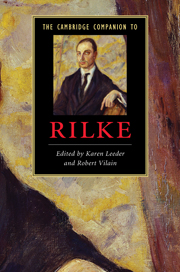Book contents
- Frontmatter
- Introduction
- PART I LIFE
- PART II WORKS
- PART III CULTURAL CONTEXTS, INFLUENCES, RECEPTION
- 8 Rilke and modernism
- 9 Rilke the reader
- 10 Rilke and the visual arts
- 11 Rilke: thought and mysticism
- 12 Rilke and his philosophical critics
- 13 Rilke’s legacy in the English-speaking world
- Appendix: Poem titles
- Guide to further reading
- Index
- Index of works
8 - Rilke and modernism
from PART III - CULTURAL CONTEXTS, INFLUENCES, RECEPTION
Published online by Cambridge University Press: 28 July 2010
- Frontmatter
- Introduction
- PART I LIFE
- PART II WORKS
- PART III CULTURAL CONTEXTS, INFLUENCES, RECEPTION
- 8 Rilke and modernism
- 9 Rilke the reader
- 10 Rilke and the visual arts
- 11 Rilke: thought and mysticism
- 12 Rilke and his philosophical critics
- 13 Rilke’s legacy in the English-speaking world
- Appendix: Poem titles
- Guide to further reading
- Index
- Index of works
Summary
This chapter places Rilke's writings and aesthetics within the broader context of modernism. Although there is little debate today about whether or not Rilke can be regarded as a modernist writer, the question as to how exactly he fits into the history and landscape of European modernism is less straightforward to answer. Never a card-carrying member of any of the numerous modernist movements that emerged during the modernist period, nor a signatory to any of the manifestos issued by these groups, he was given to styling himself as a solitary writer beyond movements. Rilke's relationship to modernism as a whole, and to individual movements within it, thus represents an individual inflection of the modes and structures of modernism to his own particular poetics.
First, though, because the term 'modernism' is much-debated and contested, it will be necessary briefly to set out the way in which I will use it. I have then divided my discussion into three sections, each of which is broadly correlated to the widely accepted stages of development of Rilke's work. 'Holistic modernism' charts the early Rilke's concerns to fuse art and life, aestheticism and vitalism. 'Metropolitan modernism' discusses the middle phase of Rilke's work, the impact of Paris and the contemporary visual arts in the New Poems (1907/8) and TheNotebooks of Malte Laurids Brigge (1910), while Rilke's late work, represented by the Duino Elegies (1912-22), is configured as 'mythic modernism'.
- Type
- Chapter
- Information
- The Cambridge Companion to Rilke , pp. 113 - 130Publisher: Cambridge University PressPrint publication year: 2010



